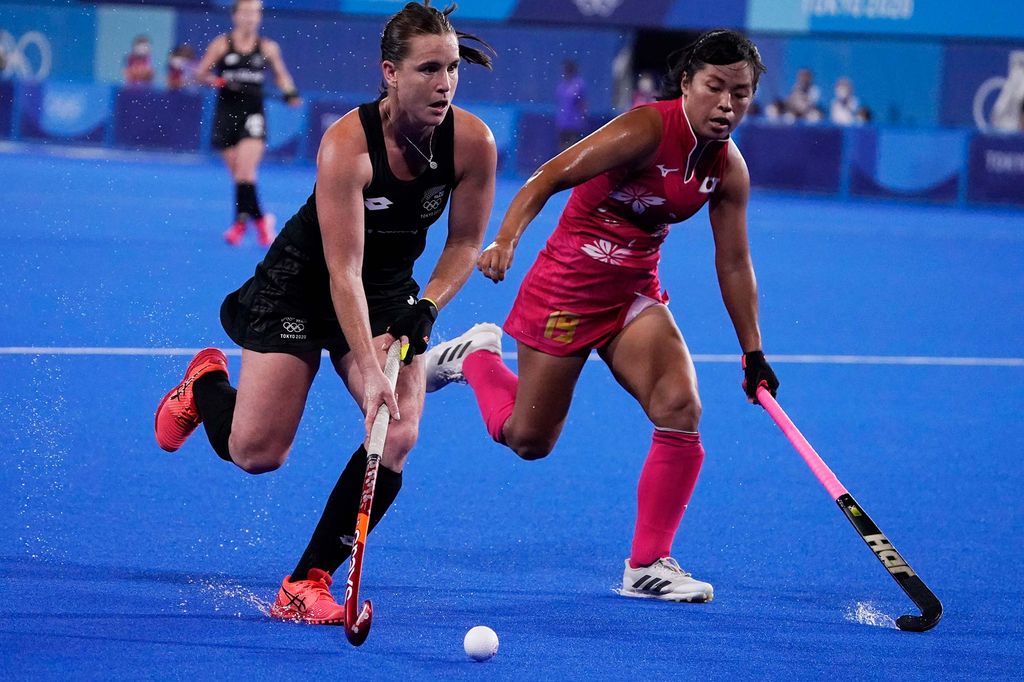BU’s Olympic Athletes Going for Gold

Julimar Avila (Sargent’19), a BU swimming and diving alum, will be representing Honduras when she swims in the women’s 200-meter butterfly in Tokyo. Photo courtesy of BU Athletics
BU’s Olympic Athletes Going for Gold
In Tokyo, one student and two alums are competing in swimming, sailing, and field hockey
This summer’s Olympic Games are like none before. Between spectator-less stadiums, the Olympic Village’s cardboard beds, and strict lockdown protocols for athletes to contain COVID-19, competitors headed to Tokyo are in for a one-of-a-kind experience—to say nothing of having had to train for the highest level of sport during a pandemic.
But don’t think Boston University’s Olympians are letting any of that slow them down when they compete this month.
For swimmer Julimar Avila (Sargent’19), making it to the 2020 Olympics is a manifestation of an almost-lifelong goal. The dual citizen is swimming for Honduras in the women’s 200-meter butterfly—the country she’s long hoped to represent in the Olympics, she says.
In addition to Avila, College of Health & Rehabilitation Sciences: Sargent College student Anna Weis (CGS’18, Sargent’22), a former BU rower, is competing in sailing in the mixed multihull Nacra 17 foiling event, and Ella Gunson, who studied at BU’s Sargent College for two semesters, is playing field hockey for New Zealand.

“I started swimming with my club team in Honduras over the summers when I was eight, and I started swimming internationally, representing Honduras, when I was 11,” explains Avila, a Hyde Park native and BU swimming and diving alum whose parents emigrated from Honduras to Massachusetts. “So, it’s always been my goal to represent Honduras at the highest level, if that ever came about.”
Avila began contemplating training for the Olympics in 2017, after swimming well at international meets like the Central American and Caribbean Amateur Swimming Confederation’s annual competition. It wasn’t until 2019, however, when she double-medaled at one meet, that she started training seriously for the 2020 Games. Then COVID-19 hit, postponing the Olympics and forcing her out of the water altogether.
When pools opened again, Avila had a decision to make: during quarantine, she’d considered taking a break from swimming to get a master’s degree. If she did resume her training, she worried, would she even be able to get back in shape in time? That’s when FINA (the Fédération Internationale de Natation) offered her a scholarship to begin training with the Azura Florida Aquatics club. She took it as a sign.
She qualified for Tokyo in June. (Fun fact: Avila found out from Instagram, despite not having an account.) There, she’s swimming alongside fellow athletes from Azura, who are representing 10 countries among 12 swimmers.
Training with other Olympic hopefuls was hugely helpful, Avila says. Not only was it motivating to have a common goal in mind, but it also made her bring her A game. “Just being in that environment makes you want to push yourself—everybody on this team is very, very fast. I came here and I was like, I thought I was speedy! And I was being humbled every training session,” she laughs.

Avila’s first race is Tuesday, July 27. When she competes, her main goal is to appreciate the experience of being at the Olympics—even if she does have to download a GPS tracking app to her phone. “On this Zoom meeting about coronavirus regulations and protocols, we were basically told that if anybody breaks any rules, you’re out,” Avila relates. “But if that’s the price to pay for the Olympics to be hosted, then I’m okay with that. I think we all just really want this to happen after the rough year everyone had.”
Her other goal, of course, is to do right by Honduras. (And, eventually, to get the Olympic rings tattooed on her.) “I obviously want to take the experience day by day,” Avila says. “But, I also want Honduras to be represented well. I’m Afro-Latina, and not only am I representing myself, but I’m also representing my family and my community. So, I want to do the best I can so I can put the name of Honduras on high.”
Interested in how COVID-19 protocols might impact athletes’ performances? Check out this conversation with Edson Filho, a Wheelock College of Education & Human Development associate professor of sport psychology and counseling.

Comments & Discussion
Boston University moderates comments to facilitate an informed, substantive, civil conversation. Abusive, profane, self-promotional, misleading, incoherent or off-topic comments will be rejected. Moderators are staffed during regular business hours (EST) and can only accept comments written in English. Statistics or facts must include a citation or a link to the citation.